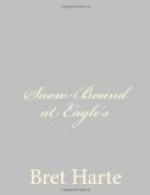“Lost their track—found it again!” shouted the ostler, as Clinch, with a cry like the baying of a hound, again darted forward. Their horses were panting and trembling under them, the ascent seemed to be growing steeper, a singular darkness, which even the density of the wood did not sufficiently account for, surrounded them, but still their leader madly urged them on. To Hale’s returning senses they did not seem in a condition to engage a single resolute man, who might have ambushed in the woods or beaten them in detail in the narrow gorge, but in another instant the reason of their furious haste was manifest. Spurring his horse ahead, Clinch dashed out into the open with a cheering shout—a shout that as quickly changed to a yell of imprecation. They were on the Ridge in a blinding snow-storm! The road had already vanished under their feet, and with it the fresh trail they had so closely followed! They stood helplessly on the shore of a trackless white sea, blank and spotless of any trace or sign of the fugitives.
“’Pears to me, boys,” said the ostler, suddenly ranging before them, “ef you’re not kalkilatin’ on gittin’ another party to dig ye out, ye’d better be huntin’ fodder and cover instead of road agents. ’Skuse me, gentlemen, but I’m responsible for the hosses, and this ain’t no time for circus-ridin’. We’re a matter o’ six miles from the station in a bee line.”
“Back to the trail, then,” said Clinch, wheeling his horse towards the road they had just quitted.
“’Skuse me, Kernel,” said the ostler, laying his hand on Clinch’s rein, “but that way only brings us back the road we kem—the stage road—three miles further from home. That three miles is on the divide, and by the time we get there it will be snowed up worse nor this. The shortest cut is along the Ridge. If we hump ourselves we ken cross the divide afore the road is blocked. And that, ’skuse me, gentlemen, is my road.”
There was no time for discussion. The road was already palpably thickening under their feet. Hale’s arm was stiffened to his side by a wet, clinging snow-wreath. The figures of the others were almost obliterated and shapeless. It was not snowing—it was snowballing! The huge flakes, shaken like enormous feathers out of a vast blue-black cloud, commingled and fell in sprays and patches. All idea of their former pursuit was forgotten; the blind rage and enthusiasm that had possessed them was gone. They dashed after their new leader with only an instinct for shelter and succor.
They had not ridden long when fortunately, as it seemed to Hale, the character of the storm changed. The snow no longer fell in such large flakes, nor as heavily. A bitter wind succeeded; the soft snow began to stiffen and crackle under the horses’ hoofs; they were no longer weighted and encumbered by the drifts upon their bodies; the smaller flakes now rustled and rasped against them like sand, or bounded from them like hail. They seemed to be moving more easily and rapidly, their spirits were rising with the stimulus of cold and motion, when suddenly their leader halted.




